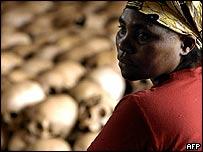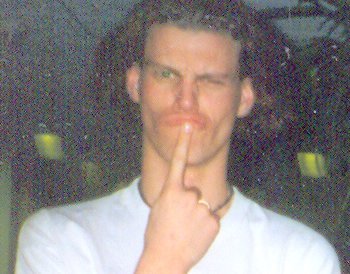Healing after Genocide
 In speaking about Rwanda and what has happened in the last ten years to PBS, journalist Helena Cobban recounted just awful stories of the region, the pain, and the continued obstacles before the people of Rwanda. The final question posed to her was, "What about Rwanda today -- what sort of path is it on? What would you highlight?" And this was here response:
In speaking about Rwanda and what has happened in the last ten years to PBS, journalist Helena Cobban recounted just awful stories of the region, the pain, and the continued obstacles before the people of Rwanda. The final question posed to her was, "What about Rwanda today -- what sort of path is it on? What would you highlight?" And this was here response:"I would highlight the word precarious, unfortunately. I look at Rwanda today as being very precarious, and needing all the love and care and prayers that we can send its way. It's a beautiful, beautiful country, in a very unstable part of the world. That's the first thing.
"The people there are all traumatized -- people who are survivors of the genocide and people who themselves participated in perpetrating the genocide. Participation in mass violence traumatizes people. Just as we know about soldiers who come back with PTSD -- but those are people who have participated in regular combat -- but people who have participated in those terrible, terrible acts of very up close and personal, direct killing and maiming and raping and looting. That traumatizes people. We have to recognize that.
"I should say, however, that there is one hopeful thing that I noticed in Rwanda -- that I hadn't really been looking for, and I haven't written much about this -- and that is the role of religion. A lot of emphasis has been placed on the involvement of various Christian churches, in particular, the Catholic church, in the genocide.
One of the amazingly hopeful things that has happened in Rwanda since the genocide has been a huge growth of evangelical Christianity. And there in Rwanda, they play a wonderful role.
"I'm a Quaker. There are Quakers in Rwanda and they are evangelical Quakers. And I was staying in an evangelical Anglican mission run by wonderful people. I met a few of these people who were evangelical, either Pentecostals or Anglicans and they were real wonderful social activists.
"In all of these institutions, I found survivors of the genocide and family members of perpetrators of the genocide working and worshipping together. To me, any force, whether it's evangelical Christianity, or any other social force that can bring about that kind of reconciliation, has to be supported and admired. It was quite genuine.
"I talked to a couple of very inspiring evangelical Anglican pastors, who were themselves Tutsi survivors of the genocide. Their testimonies were so moving, about how they had actually stood up to the genocidaires when they came to their door and used a kind of Christian-based reaching out: How could you do this to a fellow Christian? Don't you remember the words of Jesus? And they actually changed the hearts of those killers, who then left their doors.
"That stuff is powerful and it's there in the whole country. To me, that's fabulous because these are people who need all the healing they can get. That was the major institution I saw providing that kind of social healing."
In Rwanda, where much of the killing was actually done with swords, it was inspiring to me to read of the Church stepping into a world of pain to be salt and light. (The note on Catholicism should not be universalized, for there are many spots in the world were protestants are the one's with swords.)

0 Comments:
Post a Comment
<< Home